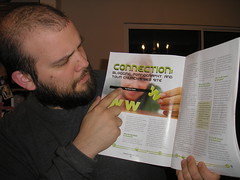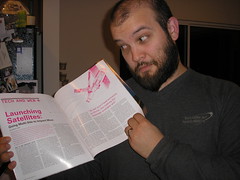

-
Can my spirit handle it?
-
Why would I want to do it?
-
Does it meet a need?
-
Who would lead a study written by me?
-
Who am I to write a study? Or is it pride?
One of our good friends, Lindsey, is applying for a summer internship. She asked my wife and I to write one of her letters of recommendation because we're her small group leaders... so we get to be her "clergy." I seldom get the chance to sit down and process into words - using my style, cliches and idioms - to get to write about one of my friends. I think this is a process that we should go through more often, as it lets you realize things about your friends and community that you may not have put into language before.
There's nothing here that I didn't instinctively know that I felt/thought about Lindsey... but I know I've never communicated them before and I know that Lindsey probably has no idea what she means to Ashley and I. So, if you would indulge me, I'd like you to meet a woman named Lindsey:
In short, Lindsey is someone we hope to always have in our lives.
Sure, that might sound over-dramatic for a simple letter of recommendation, but it’s the truth and needs to be said. After you get to meet her and know her, you’ll be saying the same thing.
Lindsey first crossed paths with my wife and I at our church’s small group that we lead. She came with one of her best friends and instantly became a solid, dependable, and appreciated contributor to the group. She’s has always been transparent and always been honest. And in the time that we’ve known her, she has grown in maturity and relationships to become a young adult who, in all honesty, will change someone’s world.
I don’t know that Lindsey cares to change the whole world. I don’t know that she has the lofty dreams to bring world peace or end world hunger (though I’m sure she’d love to be involved an organization that could). Instead, I think she want to make impacts on a personal level. She wants to develop true trust and true relationships. Then she’ll pull you along side her and change other people’s worlds together.
Yet even with all of her knowledge and charisma, Lindsey retains humility and a thirst for knowledge. She still comes to our church’s small group, taking in whatever nuggets of wisdom are tossed about. She is currently serving as our social services coordinator, where she plans activities for our group to serve the community. Most importantly, her presence in the group brings a continual smile to all involved.
I have no doubt that whatever task Lindsey applies herself to she will succeed. She is a determined soul and will seek out whatever experience or knowledge she needs to accomplish the task. If she can’t acquire the necessary tools, then it won’t take her long to make a friend who will fill in those gaps. She is great at pulling people together and working for something better than themselves.
Lindsey has become a part of my wife and I’s lives and we are better for it. My only hesitation in recommending Lindsey to you is that she’d be away from our flow of life for the summer.
If you choose to bring Lindsey on board with the program, you will need to give her a great placement with a great task, else you will be squandering her abilities. I have no doubt that she will astound you as she has astounded us.
 Now available on LifeWay.com are digital downloads of the Fuel Fire Starter videos. These videos are fun digital shorts to be played during youth group meetings and such. The Fuel product line has been around for several years now and the production just gets better and better each time. The videos available for download now are some of the best single-episode shorts from the (nearly) 100 sessions we have available on the DVDs.
Plus, this gives me an excuse to post what is now my favorite image on the LifeWay Online Catalog: *shocked* Little Red Riding Hood.
Now available on LifeWay.com are digital downloads of the Fuel Fire Starter videos. These videos are fun digital shorts to be played during youth group meetings and such. The Fuel product line has been around for several years now and the production just gets better and better each time. The videos available for download now are some of the best single-episode shorts from the (nearly) 100 sessions we have available on the DVDs.
Plus, this gives me an excuse to post what is now my favorite image on the LifeWay Online Catalog: *shocked* Little Red Riding Hood.
